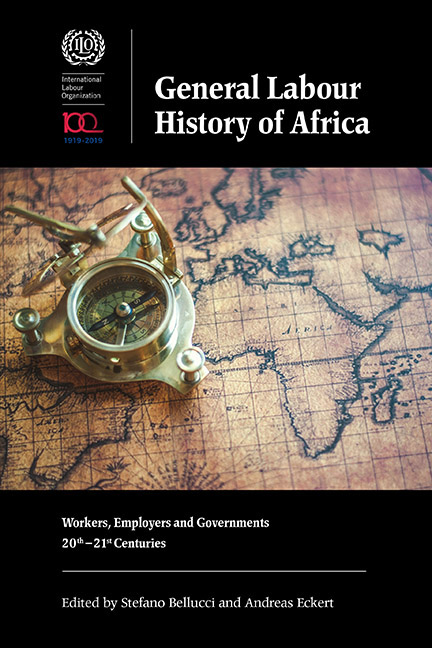Book contents
- Frontmatter
- Contents
- List of Maps and Figures
- List of Tables
- Notes on Contributors
- Foreword
- Acknowledgements
- The ‘Labour Question’ in Africanist Historiography
- Part I Free and Unfree Labour
- Part II Key Sectors
- Part III International Dimensions and Mobility
- Part IV Varieties of Work
- Part V Entrepreneurs and Self-Employment
- Part VI The State, Unions and Welfare
- 18 Labour and the State
- 19 Trade Unions
- 20 Social Welfare
- 21 Mutualism and Cooperative Work
- Part VII Conclusions
- Select Bibliography
- Index
21 - Mutualism and Cooperative Work
from Part VI - The State, Unions and Welfare
Published online by Cambridge University Press: 21 September 2019
- Frontmatter
- Contents
- List of Maps and Figures
- List of Tables
- Notes on Contributors
- Foreword
- Acknowledgements
- The ‘Labour Question’ in Africanist Historiography
- Part I Free and Unfree Labour
- Part II Key Sectors
- Part III International Dimensions and Mobility
- Part IV Varieties of Work
- Part V Entrepreneurs and Self-Employment
- Part VI The State, Unions and Welfare
- 18 Labour and the State
- 19 Trade Unions
- 20 Social Welfare
- 21 Mutualism and Cooperative Work
- Part VII Conclusions
- Select Bibliography
- Index
Summary
This chapter discusses the salient aspects of mutualistic associations and cooperative labour in Africa in the twentieth century. The introduction covers the conceptualizations of mutualistic associations and cooperative labour in Africa. They are discussed under the theory of African communalism and neoliberalism, highlighting the contending issues. Given the regional variations and contexts, the study of mutualistic association and cooperative labour takes cognizance of their similarities and differences in North, East, West and Southern Africa. The focus is on the factors for their growth, scope, performance and the challenges they faced. The role of state and/or governments in either promoting mutualism or cooperative labour or in the demutualization of African societies is investigated.
Mutualism is an alternative means of economic organization, namely common ownership of the means of production, where workers share in its profitability. In social mutualism, employees share in the management of public services. It is the process of bringing together cooperative and voluntary associations to achieve the desired objectives. According to the labour theory of value, labour or a service must be paid for commensurately. In the context of utopian socialist theory, Robert Owen outlined the selfish principle in humans, called the competition principle, for the gratification of their wants and propensities as embedded in neoliberalism. Conversely, the cooperative principle promotes acts of benevolence and reciprocity. Neoliberalism promotes an economy based on competition, leading to inequality and unstable societies. This is what led to the establishment of cooperatives in England in the mid-nineteenth century, when liberalism undermined the social foundations of society and promoted inequality and unstable business.
The concept of mutualistic associations and cooperative labour principles was ingrained in African societies even before colonialism. These principles were modelled on kinship and neighbourhood groups formed to perform certain tasks. They allowed the pooling of resources and the sharing of proceeds. These traditional cooperative principles were adopted in the building of homesteads, the breaking of land, planting, herding, harvesting and hunting. The cooperative spirit or the notion of self-help and mutualistic association was widespread. In Arab North Africa, traditional and informal types of self-help and mutual help societies referred to as Jam'iyyat, or Al taawaniya for formal cooperatives, were popular. Many of them were seen as a combination of ‘self-help’ and ‘charitable’ activities, as well as providing social services and assisting poor families.
- Type
- Chapter
- Information
- General Labour History of AfricaWorkers, Employers and Governments, 20th-21st Centuries, pp. 585 - 614Publisher: Boydell & BrewerPrint publication year: 2019



